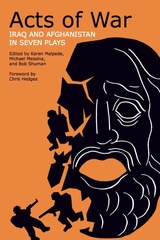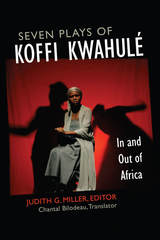2 books about Seven Plays

Acts of War
Iraq and Afghanistan in Seven Plays
Karen Malpede
Northwestern University Press, 2011
As Karen Malpede points out in her introduction to Acts of War, tragedy "arose as a complement to, perhaps also as an antidote to, war." The greatest of the early playwrights wrote from experience—Aeschylus and Sophocles were generals in the Athenian army, and Euripides was a combat veteran. Electronic media reports war instantly, but the stage provides an unrivaled venue for facing the horror of armed conflict on a human scale.This timely anthology of plays by American and British writers bears witness to the realities of the wars in Iraq and Afghanistan for combatants and civilians alike and asks what it means to be a citizen in a democracy at war. From violence on the battlefield and in the cells of Guantanamo to the toll exacted on the homefront, the seven plays collected by Malpede, Messina, and Shuman explore in depth the costs of war. Sometimes with humor or erotic charge, always with compassion and surprising insight, these contemporary plays return to the theater a necessary social edge.Karen Malpede’s introduction sets the plays in the broader contexts of theater’s roots and recent history, while award-winning journalist and author Chris Hedges provides a foreword.
[more]

Seven Plays of Koffi Kwahulé
In and Out of Africa
Judith G. Miller, Editor, Chantal Bilodeau, Translator
University of Michigan Press, 2017
The work of renowned Ivoirian playwright Koffi Kwahulé has been translated into some 15 languages and is performed regularly throughout Europe, Africa, and the Americas. For the first time, Seven Plays of Koffi Kwahulé: In and Out of Africa makes available to an Anglophone audience some of the best and most representative plays by one of Francophone Africa’s most accomplished living playwrights.
Kwahulé’s theater delves into both the horror of civil war in Africa and the diasporic experience of peoples of African origin living in Europe and the “New World.” From the split consciousness of the protagonist and rape victim in Jaz to the careless buffoonery of mercenaries in Brewery, Kwahulé’s characters speak in riffs and refrains that resonate with the improvisational pulse of jazz music. He confronts us with a violent world that represents the damage done to Africa and asks us, through exaggeration and surreal touches, to examine the reality of an ever-expanding network of global migrants. His plays speak to the contemporary state of humanity, suffering from exile, poverty, capitalist greed, collusion, and fear of “the other”—however that “other” gets defined.
Judith G. Miller’s introductory essay situates Kwahulé among his postcolonial contemporaries. Short introductory essays to each play, accompanied by production photos, contextualize possible approaches to Kwahulé’s often enigmatic work. Anglophone theater scholars and theater professionals eager to engage with contemporary theater beyond their borders, particularly in terms of what so-called minority theater artists from other countries are creating, will welcome this indispensable collection. Students and scholars of African studies and of global French studies will also find this work intriguing and challenging.
Kwahulé’s theater delves into both the horror of civil war in Africa and the diasporic experience of peoples of African origin living in Europe and the “New World.” From the split consciousness of the protagonist and rape victim in Jaz to the careless buffoonery of mercenaries in Brewery, Kwahulé’s characters speak in riffs and refrains that resonate with the improvisational pulse of jazz music. He confronts us with a violent world that represents the damage done to Africa and asks us, through exaggeration and surreal touches, to examine the reality of an ever-expanding network of global migrants. His plays speak to the contemporary state of humanity, suffering from exile, poverty, capitalist greed, collusion, and fear of “the other”—however that “other” gets defined.
Judith G. Miller’s introductory essay situates Kwahulé among his postcolonial contemporaries. Short introductory essays to each play, accompanied by production photos, contextualize possible approaches to Kwahulé’s often enigmatic work. Anglophone theater scholars and theater professionals eager to engage with contemporary theater beyond their borders, particularly in terms of what so-called minority theater artists from other countries are creating, will welcome this indispensable collection. Students and scholars of African studies and of global French studies will also find this work intriguing and challenging.
[more]
READERS
Browse our collection.
PUBLISHERS
See BiblioVault's publisher services.
STUDENT SERVICES
Files for college accessibility offices.
UChicago Accessibility Resources
home | accessibility | search | about | contact us
BiblioVault ® 2001 - 2024
The University of Chicago Press









